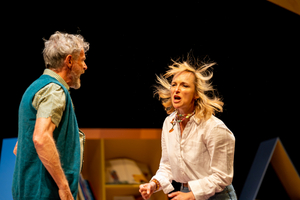Review: EUREKA DAY at Dunstan Playhouse, Adelaide Festival Centre
More relevant than ever.
 Reviewed by Barry Lenny, Tuesday 16th November 2021.
Reviewed by Barry Lenny, Tuesday 16th November 2021.
The State Theatre Company of South Australia's final production for 2021 is Jonathan Spector's comedy, Eureka Day, in which the story takes place at the Eureka Day School in Berkeley, California, a private school with very progressive ideals. There has been an outbreak of mumps. Half a century ago, all students would have simply lined up to be vaccinated as a matter of course, and nothing would have been said about it. Today, however, everybody involved wants to have his or her say. All decisions on the running of the school are decided by a consensus, not by a majority, but this one sharply divides those concerned.
Written before COVID-19, this play is highly topical today. Much of what happens in discussions and arguments here is happening online now, on FaceBook and Twitter. You will find it all too familiar.
The play opens with a group of five people, four long-term members, and one new member, who are meeting to discuss and find a consensus on whether or not to add a category, 'transracial adoptee', to a drop-down menu on the school's website. The other four attempt to indoctrinate the newcomer, Carina, an African-American, single mother, played by Sara Zwangobani, in the ethos of the school and its management. Although all voices are supposedly equal, the school principal, Don, played by Glynn Nicholas, appears to have assumed the role of mediator, leading and guiding the discussion to a conclusion while attempting to please everybody.
If you are a fan of Red Dwarf, you will recall the episode, Polymorph, in which Rimmer loses his anger and becomes a, ineffectual, bespectacled mediator. That will give you an idea of Don's character, bringing forth laughter by using terms such as 'unpack this' and 'acknowledge that'. He closes every meeting by insisting on reading a poem by the Sufi poet, Rumi. Even with this trivial matter on the agenda, though, there is extensive pointless discussion, and there are small signs of cracks in the group that suggests that there has not entirely been a consensus. Oh, and let's not forget note-making on large rolls of butcher's paper.
The other members of the group include Meiko, played by Juanita Navas-Nguyen, who uses the meeting time wisely by busily knitting, making only an occasional remark, and the extremely wealthy Eli, played by Matt Hyde, with whom she is having an affair, thanks to his open marriage. The last of the group is the rather brittle Suzanne, portrayed by Caroline Craig. Suzanne and Eli are the ones who primarily impose their will on the decision-making.
With the announcement of a child having mumps, the authorities send a letter that informs the school that unvaccinated students are to quarantine at home. There is never going to be a consensus on this, with Suzanne strongly against vaccination, concerned for her own child, and Carina holding the opposite viewpoint, considering the community as a whole. It worsens when it affects members of the group, personally. They decide to throw it open to the entire school community in a FaceBook discussion.
The most hilarious part of the play is when this takes place. Why the playwright wrote dialogue for this section I have no idea. One could barely hear any of it for the continuous, raucous laughter at the 'online' conversations, displayed on a large screen behind the performers. You've probably seen much the same on FaceBook, or Twitter,
It's all there, the 'fake news', 'alternative facts', "I did my own research", which means finding a couple of YouTube videos by unqualified people who agree with your beliefs, " I don't know what's in it", "It causes autism", and so much more nonsense. You'll need the interval to recover from your aching sides.
The second half brings it all back to the five members of the group again, and exposes some of the reasons for their attitudes. There are myriad emotions involved, and enormous conflicts within the group, for which, it is obvious, there can never possibly be a consensus.
Director, Rosalba Clemente, has assembled a very solid cast and crafted production with plenty of pace, and lots of light and shade. The cast each create thoroughly believable characters, work extremely well as an ensemble, and all have superb comic timing.
Meg Wilson's school library set is very effective, and well-lit by Mark Shelton, and it is the audio-visual work of Chris Petridis that generates all of that laughter at the end of the first act. Original music is by Stuart Day and the sound is by Andrew Howard, all adding to this fine, thought-provoking performance.
Reader Reviews

Videos
